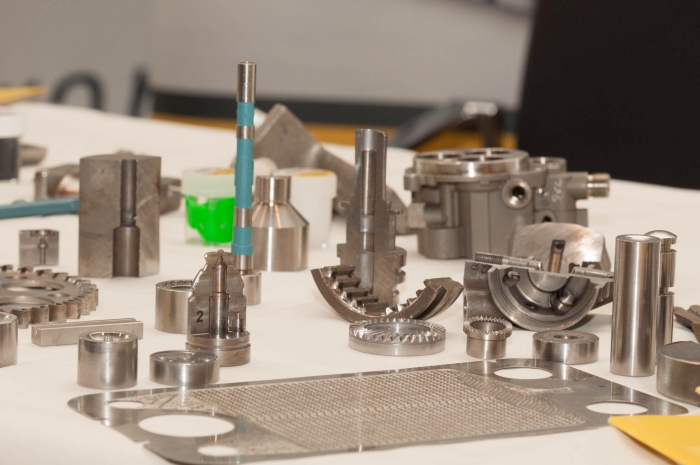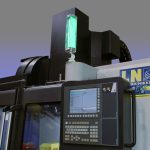Trade fair scheduled for deburring technology and precision surface finishing
Trade fair scheduled for deburring technology and precision surface finishing
Whether traditional or new manufacturing processes are involved, none of the available technologies make it possible to produce component surface finishes in the required quality. Process steps such as deburring, rounding and cleaning, as well as targeted functional or decorative surface finishing, are thus indispensable. Solutions by means of which these tasks can be executed reliably and economically will be presented at DeburringEXPO at the Karlsruhe Exhibition Centre from Oct. 8-10, 2019. Beyond this, the third leading trade fair for deburring technology and precision surface finishing will provide valuable know-how at its bilingual expert forum.
.jpg)
Article from DeburringEXPO
Whether traditional or new manufacturing processes are involved, none of the available technologies make it possible to produce component surface finishes in the required quality. Process steps such as deburring, rounding and cleaning, as well as targeted functional or decorative surface finishing, are thus indispensable. Solutions by means of which these tasks can be executed reliably and economically will be presented at DeburringEXPO at the Karlsruhe Exhibition Centre from Oct. 8-10, 2019. Beyond this, the third leading trade fair for deburring technology and precision surface finishing will provide valuable know-how at its bilingual expert forum.

Parts manufacturing is faced with new tasks in numerous areas. Due to more and more complex geometries and finer structures, machined, formed, primary formed, forged, sintered and molded workpieces are not only resulting in stricter requirements where actual parts production is concerned, but rather during deburring and surface finishing as well. The technical cleanliness of components is an essential quality criterion in many industry sectors such as the automobile and automotive supplier industries, aerospace and aviation, machinery manufacturing, medical engineering, metrology, precision engineering, sensor technology and drive technology, as well as in the field of electro-mobility.
"Reliable deburring, during which extremely fine burrs and flash must also be removed depending on the degree of required cleanliness, is a fundamental prerequisite for complying with cleanliness specifications," explains Hartmut Herdin, managing director of fairXperts GmbH & Co. KG, promoters of DeburringEXPO.
Furthermore, in some cases surfaces are required which minimize friction, wear and noise, and which make it possible to enhance performance and extend service life. Downstream processes such as joining, sealing, coating and assembly also necessitate burr-free and in some cases rounded edges for various reasons. And thus, for example, in the field of sheet metal processing, deburring minimizes the risk of injury due to sharp edges and reduces tooling wear for edging and straightening machines. On the other hand, good deburring and well-defined edge rounding make it possible to enhance painting quality at the edges.
"Relying solely on experience gained with previously used processes for these tasks can quickly lead to a competitive disadvantage. Benchmarking is thus advisable which focuses central attention on searching for the most effective, reliable and economical technologies," explains Herdin.
Companies are also being confronted with new tasks in the area of surface finishing, which result from innovative production processes such as additive manufacturing (AM). The removal of residual powder and supporting structures, as well as the rough and porous surfaces produced by these processes, are challenging.
Cross-Industry, Cross-Technology Information
The above mentioned tasks and many others as well will be explored at the upcoming DeburringEXPO, which will be held at the Karlsruhe Exhibition Centre from the 8th through the 10th of October, 2019. As of the end of March, 125 exhibitors from eleven countries, including numerous market and technology leaders, had already made firm booking for their booth floor space. Offerings for solutions involving deburring, rounding and the production of precision surface finishes, which are unparalleled at any other event around the world, will await the trade fair visitors.
The exhibition portfolio covers products, systems, processes and services for deburring, the production of precision surface finishes and cleaning after deburring, as well as measuring and test technology and analysis systems for quality control and quality assurance for components made of practically every conceivable material in nearly all industry sectors. Opportunities for further qualification and technical literature will also be found at the event. With its comprehensive spectrum, DeburringEXPO not only covers the entire process sequence for deburring and the production of precision surface finishes, it also identifies trends and imparts practical, as well as theoretical knowledge.
Bilingual Expert Forum – Know-How as Added Value
Due to its unique character and its highly practical orientation, the three-day expert forum integrated into DeburringEXPO is a popular source of knowledge. Presentation focal points include fundamentals, approaches to process and cost optimization, reports on best practice applications and current trends. Talks on special issues such as the process sequence for sheet metal deburring, post-processing of AM parts and cleaning after deburring round out the forum program. All talks held at the DeburringEXPO expert forum will be simultaneously interpreted (German-English/English-German). Participation is free of charge for visitors.





